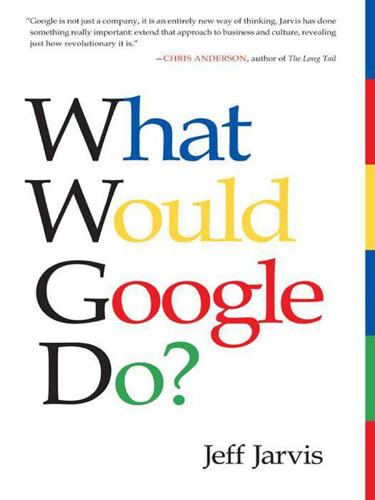
What Would Google Do?
by
Jeff Jarvis
Published 15 Feb 2009
Patients rate doctors—like teachers and plumbers—at various online services, but they’re not terribly helpful because I don’t know anything about the people leaving comments. I’d at least like to get a list of all the conditions a doctor treats and how often so I can pick the most experienced specialist. If a Googley restaurant would tell me how many diners ordered the crab cakes, a Googley doctor should tell me how often she has treated afib. I would also be impressed if the doctor treating me had written about the condition online. I’d be doubly impressed if I saw other doctors linking to her. The changes in medicine we’ve touched on all relate to information: opening it up, sharing it, organizing it, analyzing it, bringing the network effect to the industry and our health.
…
Everybody needs Googlejuice Googlejuice? That’s the magic elixir you drink when Google values you more because the world values you more. It’s another virtuous circle: The more links, clicks, and mentions you get, the higher you rise in Google’s search results, offering you the potential for yet more clicks. The rich get richer, the Googley Googlier. I wonder whether, someday, companies will come to be valued not only on their revenue, marketshare, EBITDA, and profit but also on their Googlejuice. The benefits of Googlejuice are lost on companies that do not make their information searchable—from local businesses that don’t have sites to stores that don’t post sales to manufacturers that don’t publish product details to magazines that put content online in overcomplicated designs and databases that Google can’t read.
…
So what did I do? Of course, I asked Google how fast an eye blinks and in .3 seconds it told me that a blink takes .3 seconds. One of Google’s own principles—the “10 things Google has found to be true”—is: “Fast is better than slow.” A pillar of its design principles—from Google’s list of what makes a design Googley—is: “Every millisecond counts…. Speed is a boon to users. It is also a competitive advantage that Google doesn’t sacrifice without good reason.” Speed is a tenet of the Google religion. Google has made us an impatient people, more than we know. If we can get any of the world’s knowledge in a blink, why should we wait on hold or in line or until your office opens?
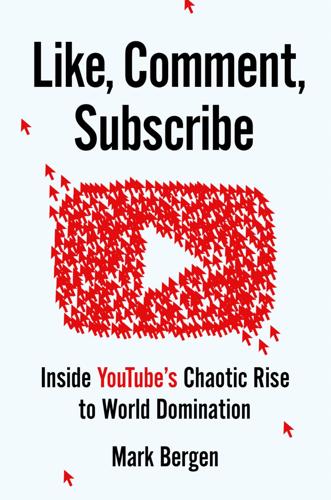
Like, Comment, Subscribe: Inside YouTube's Chaotic Rise to World Domination
by
Mark Bergen
Published 5 Sep 2022
Early on this was a tangible corporate asset. In a book on management, Laszlo Bock, Google’s longtime HR boss, wrote that the company hired for “Googley” traits: humility, conscientiousness, and “comfort with ambiguity.” Being willing to plunge down a slide at work without shame—that’s Googley. Being Googley had a motto: “Don’t politick. Use data.” During a debate before buying YouTube, one Google executive questioned if the company should be profiting from pirated material, asking over email, “Is this Googley?” But over time “being Googley” had also morphed into an epithet for someone with a slavish devotion to Google’s management culture and system of pedigree, someone who would subsume emotion and eccentricity for the greater Google cause, who could be a bit of a cipher.
…
He was told that such tweaks could appear as opposition to free speech, something Google wanted to avoid, and might disrupt the sanctity of search. He heard one concern repeatedly: “That’s not very Googley.” Where was his data to support that argument? Another person working at YouTube then recalled that after she protested a particular decision, co-workers accused her of not being “positive” and “Googley.” Once, Mengerink’s position was called “creepy.” His colleagues were not unaware of objectionable videos or particularly fond of them. They had begun discussing ideas for a “penalty box” treatment for troublesome creators like Alex Jones, a conspiracy theorist whose talk show, InfoWars, was gaining a massive audience on YouTube.
…
Libraries celebrated banned books and free speech, kind of like YouTube. “We’re really more like a library,” Wojcicki said. This was a strained analogy for the chief of a division that would net $11.2 billion in sales that year by placing ads in front of its library material. But it was very Googley. Wojcicki then laid out her Googley fix for YouTube’s conspiracy problem: the company would introduce “information cues,” little boxes of text beneath videos about flat-earth and other “well-known internet conspiracies.” It would scrape this material from Wikipedia, as Google did on search, relying on this user-generated, nonprofit site that managed to hew consistently to the truth.
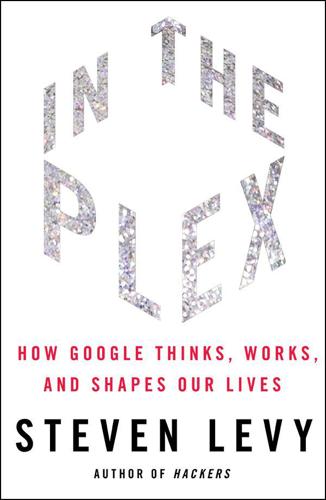
In the Plex: How Google Thinks, Works, and Shapes Our Lives
by
Steven Levy
Published 12 Apr 2011
As Salah learned more about the company and began furnishing the buildings that Google would later populate, he roughed out a set of design guidelines that expressed what he saw as Larry and Sergey’s values. The list centered on several “key performance principles.” The very first one: “Create a ‘Googley’ atmosphere.” Being truly Google goes beyond painting the walls with bright colors and liberally distributing lava lamps. A Googley space is one that reflects—and supports—our employees. We are a diverse team of committed, talented, smart, thoughtful hard-working individuals. Our core values should be manifested in our work environment. It didn’t take long for Google to begin growing out of Bayshore—the head count was doubling in size every few months as deals brought in new traffic, and the success of ads required a whole infrastructure of billing and business operations.
…
When Schillace went to Google in 2006, he had to struggle to get resources in the data center. “They had this crazy hand-cobbled system where there was one guy in the middle doing the planning—it was, like, put a bottle of vodka on his desk, and you’d get your machines for the service.” That un-Googley system was replaced by something very Googley—an auction-based allocation. Google’s chief economist, Hal Varian, would later explain how it worked when new data centers open: “We’ll build a nice new data center and say, ‘Hey, Google Docs, would you move your machines over here?’ And they say, ‘Sure, next month.’ Because nobody wants to go through the disruption of shifting.
…
The eighteen APMs on the trip worked all over Google: in search, advertising, applications, and even stealth projects such as Google’s attempt to capture the rights to include magazines in its index. Mayer’s team, along with the APMs themselves, had designed the agenda of the trip. Every activity had an underlying purpose to increase the participants’ understanding of a technology or business issue, or make them more (in the parlance of the company) “Googley.” In Tokyo, for instance, they engaged in a scavenger hunt in the city’s legendary Akihabara electronics district. Teams of APMs were each given $50 to buy the weirdest gadgets they could find. Ducking into backstreets with stalls full of electronic parts and gizmos, they wound up with a cornucopia: USB-powered ashtrays shaped like football helmets that suck up smoke; a plate-sized disk that simulated the phases of the moon; a breathalyzer you could install in your car; and a stubby wand that, when waved back and forth, spelled out words in LED lights.
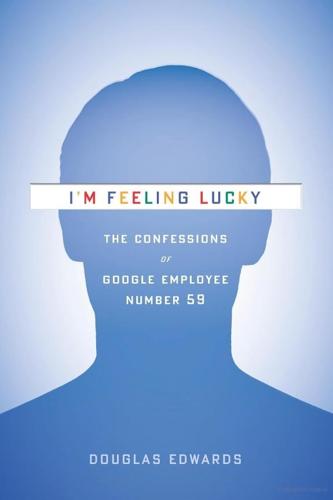
I'm Feeling Lucky: The Confessions of Google Employee Number 59
by
Douglas Edwards
Published 11 Jul 2011
We could easily spot the aspirants—they'd be sitting out on the deck sweating in navy blue suits while all around them Googlers in shorts and sandals chatted and chewed. Any Googler who happened to be within earshot could pepper candidates with questions, and the answers could influence a hiring decision as much as anything in the formal interview process. Giving off a "Googley" vibe mattered. I never knew whom I might bump into while waiting for a fresh platter of polenta to be put out. At first, celebrity drop-ins tended to be tech luminaries like pundit Esther Dyson, Sun superstar Kim Polese, or the chairman of Intel, but as Google's fame grew, you were just as likely to run into Nobel laureates and internationally known politicians, people like Muhammad Yunus, Queen Noor, Bill Clinton, or Jimmy Carter, pushing trays along the aluminum rails under Charlie's watchful eye as the Grateful Dead wailed from wall-mounted speakers.
…
Individual servers, whether of web pages or of steamed broccoli, might give out, but the system wasn't truly broken as long as it kept delivering results. To their undying credit, Charlie, Jim, and the rest of the Google kitchen crew never experienced a catastrophic failure. Day after day after day, they fed us—their infrastructure running on elbow grease, ingenuity, and heart. It was a very Googley way to be. Chapter 8 Cheap Bastards Who Can't Take a Joke HOW MANY GOOGLERS does it take to screw in a light bulb?" Sergey asked the UI team in late February 2000. His complaint was about browser buttons—a trivial bit of code that allowed users to add Google search links to their web-surfing software.
…
"If they liked something they'd say, 'It doesn't seem too sucky,'" recalls facilities manager George Salah. "When they pushed back on something, they'd say, 'Hmmmm, that seems suboptimal' or use some technical way of saying something between yes and no. They never gave a clear decision." When I took copy to Sergey for approval, he would say, "It's cute. I like it" or "No. That's not very Googley." Once I spent days with my team developing a full rationale for an ad campaign, based on what we understood about the target audience and their motivations. Sergey glanced at the layouts, frowned, and said, "I think you need to think about it some more." "Is it the concept you don't like? The art?
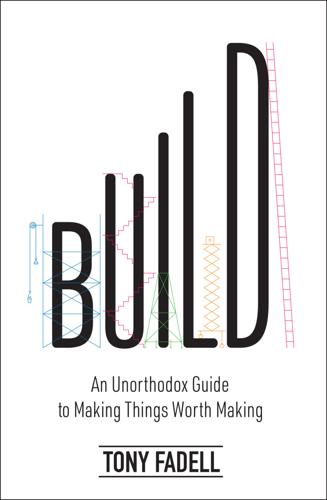
Build: An Unorthodox Guide to Making Things Worth Making
by
Tony Fadell
Published 2 May 2022
We’d also bought a company called Dropcam and created the first Nest Cam and added it to the Nest app and spent countless hours trying to integrate with Google and figure out email addresses, corporate security, whose servers had what data on them, privacy policies, etc. And despite being part of Google, we made little attempt to be Googley, to truly join the culture. A small contingent of Nesters had come from Apple, where Google was Enemy #1 and they had to be talked down from a cliff. But most of us just liked our way of doing things. We didn’t want to be Googley. I wasn’t about to wear a propeller baseball hat, like new Googlers do. I can understand why we stood out like a sore thumb, why we weren’t welcomed with open arms. But even with all that, the acquisition wasn’t a complete disaster.
…
We were just last night’s dinner. If I had talked to regular employees on the teams we wanted to integrate with, I would have found out what their priorities were and whether they were remotely interested in working with us. I would have understood better what it meant to be Googley and whether we had a chance of breaking through—and whether we could ever change what being Googley really meant. Culture is incredibly sticky. I should have remembered that. Larry, with Bill Campbell’s prodding, wanted Nest to come in and shift Google’s entire way of thinking, to give it a burst of startup mojo. But culture doesn’t work that way—you can’t repaint an old factory and show the workers a training video and think you’ve made any kind of difference.
…
On day one, with just a tweet-sized number (of very public) words, we innocently, naively alienated the company we had just joined. Many Googlers saw us as a band of fighters running at them, armed to the teeth and ready for war, already declaring independence, already rejecting Google’s core business, and thought, Huh. What’s up with them? Not very Googley. The Google teams with whom we’d planned to integrate and codevelop technologies and products were reluctant to work with us. They kept asking their execs for more details to figure out if they really had to help us at the expense of their own projects. Why? Why? Why do we have to help a team that isn’t Google?
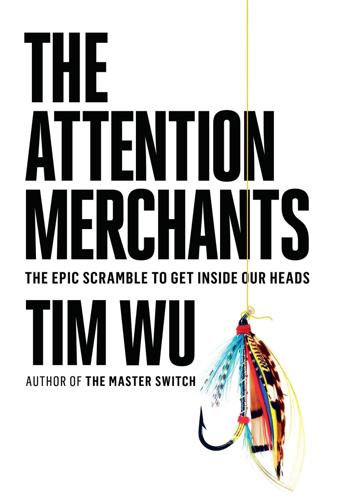
The Attention Merchants: The Epic Scramble to Get Inside Our Heads
by
Tim Wu
Published 14 May 2016
Google demanded that its things work faster and better than anyone else’s, and without the compromises so many other products put up with. Combined, these two qualities came close to defining “Googley,” an adjective used on campus for things that reflected the firm’s idea of the good.15 However they could express this ideal they did. Why not have a campus where the food is both delicious and free, so you didn’t waste time in line at the cash register? Why not give away gigabits of free storage to users? Scan the world’s books? Drive trucks mounted with cameras through the streets everywhere and create a pictorial map? But nothing should be Googley-er than the flagship itself: and so Google search had to be not merely better than the rest but a thousand times better than those ugly and slow stepsisters, like Yahoo!
…
Flynn, “With Goto.com’s Search Engine, the Highest Bidder Shall Be Ranked First,” New York Times, March 16, 1998, http://www.nytimes.com/1998/03/16/business/with-gotocom-s-search-engine-the-highest-bidder-shall-be-ranked-first.html; “Rankings for Sale: Payola on the Information Highway? Or Payments for Good Shelf Space?,” From Now On: The Educational Technology Journal 10 (2001), http://www.fno.org/apr01/payola.html. 14. Brin and Page, “The Anatomy of a Large-Scale Hypertextual Web Search Engine.” 15. For a description of the term “Googley,” see Sara Kehaulani Goo, “Building a ‘Googley’ Workforce,” Washington Post, October 21, 2006. 16. A more detailed description of Google’s AdWords can be found at “How AdWords Works,” Google Support, February 21, 2016, https://support.google.com/adwords/answer/2497976?hl=en. For additional information about AdWords success, see Peter Coy, “The Secret to Google’s Success,” Bloomberg Business, March 5, 2006; Steven Levy, “Secret of Googlenomics: Data-Fueled Recipe Brews Profitability,” Wired, May 22, 2009. 17.
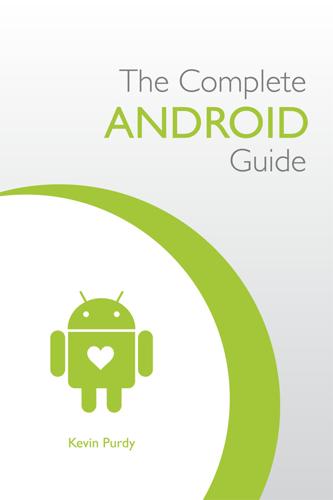
The Complete Android Guide: 3Ones
by
Kevin Purdy
Published 15 Apr 2011
If you've traded a few emails back and forth, and Google's mathematical formula deems you to be fairly copacetic, that other person gets copied into "My Contacts." In theory, this should save you headaches. In practice, it is its own unique kind of migraine. Almost as if to confess to its confusion, Google's Contacts on Android lets you choose which Google Contacts groups to sync, so that you can have your whole Google-y world linked up by checking each group, along with "All Other Contacts," or just sync up "My Contacts," or whatever other group you've chosen. We'll make our own syncing group in just a bit—for now, let's finish up with what we have in the "Display Options." Syncing Twitter, Facebook, e-mail etc. with contacts Just below your main Google account listing you'll see the syncing options for any other email accounts you've set up on your phone, along with social networks like Facebook or Twitter, and any other application where you'd build your own contact list.
…
You can choose "Text Messaging" from the main menu to read and send messages, but at any point, you can also hit the "+" button in the upper-right corner to create a new message, and choose text message to start composing an SMS. * * * The built-in Messaging app doesn't seem all that new, different, or Google-y from a glance—and Google Voice is, in some ways, the better way to go with an Android phone—but it's all the other features of your phone that make Messaging more convenient than with a "chiclet" phone: voice input, alternative swipe-style keyboards, copy/paste between SMS and other apps, and good apps for sending and viewing pictures, audio, and video.
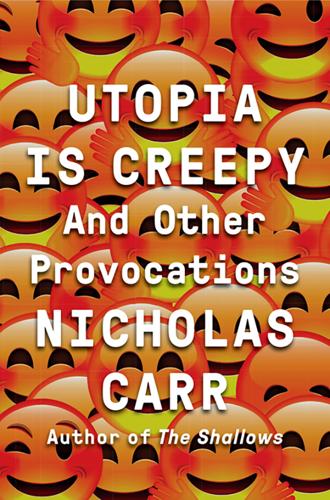
Utopia Is Creepy: And Other Provocations
by
Nicholas Carr
Published 5 Sep 2016
He explains: “Our ads should always be aesthetically pleasing so people will think happy thoughts when they think of Google.” Page is rarely so callous, but like his friend he seems blind to shades of gray, particularly when looking at his own company. Even his vocabulary is black and white. What’s good is “Googley.” What’s bad is “Not Googley.” Any outsider who dares to question Google’s motives or criticize its actions is a “bastard.” The word “evil” is tossed around carelessly. Such a blinkered and self-serving view of the world may be forgivable in a young entrepreneur trying to get an ambitious technology company off the ground, but as Google has grown and its influence expanded, its hubris has become a problem.
…
The way he responds to the antitrust investigations, to the company’s aggressive new rivals, and to persistent public concerns about online privacy and security will determine whether Google flourishes or flounders in the years ahead. His success will likely hinge on his ability to get beyond a black-and-white, us-versus-them view of the challenges facing his company, to realize that even bastards may have a point. He’ll have to become a little less Googley and a little more worldly. That won’t be easy. Edwards begins his book with an anecdote about a meeting he had with Page back in 2002. Bruised by the founder’s tendency to dismiss or ignore his suggestions, the marketer arrives at Page’s office looking to ingratiate himself with his prickly boss.
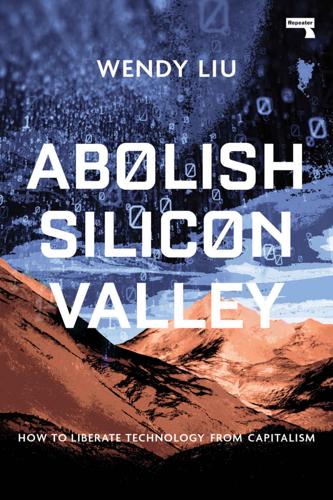
Abolish Silicon Valley: How to Liberate Technology From Capitalism
by
Wendy Liu
Published 22 Mar 2020
I was hesitant at first, unsure whether I was good enough yet, but I sent over my resume anyway, and my colleague forwarded it to a friend of his who was willing to submit an internal referral for me. A short while later, a recruiter reached out to schedule a coding interview over the phone. I read everything I could about the Google interview process, brushing up on notes from my algorithms classes and scrutinising explanations of what it meant to be “Googley”. As a result, the first phone interview was a breeze: forty-five minutes of writing code in a Google Doc while strategically narrating my thought process out loud, like all the blog posts suggested. Not long after, my recruiter congratulated me on passing the phone screen; I would henceforth be in a “pool” with the other interns, waiting for a full-time employee to pick me for an interview with their team.
…
As ignorant as I was, with my default assumption of corporate good intent, I wasn’t naive enough to assume that Google’s famed transparency and perks extended to these workers, too. Even as an intern, I was allowed to treat two guests a month to the free food and facilities. No one really cared if you went over; it was an honour system in which everyone was expected to be appropriately Googley. But these red-badged workers — did they get to bring guests? Did they get to fill take-out containers to bring home? I never saw them on the buses, and I doubted any of them lived close enough to commute by foot. In the vicinity of the Google San Francisco office there was little but startups, tourist traps, and luxury residential buildings with one-bedroom apartments renting for $4,000 a month.
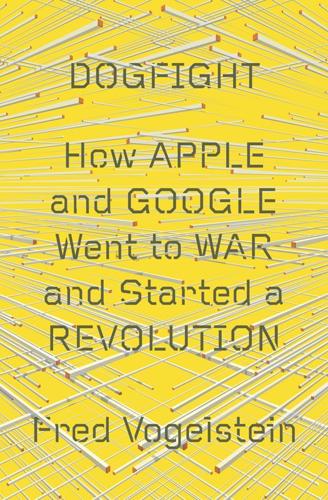
Dogfight: How Apple and Google Went to War and Started a Revolution
by
Fred Vogelstein
Published 12 Nov 2013
But after the euphoria of the acquisition wore off, it became clear that even at Google getting Android off the ground was going to be one of the hardest things Rubin had undertaken in his life. Just navigating Google itself was initially a challenge for Rubin and his team. There was no hard-and-fast org chart, as in other companies. Every employee seemed right out of college. And the Google culture, with its famous “Don’t be evil” and “That’s not Googley” sanctimony, seemed weird for someone such as Rubin, who had already been in the workplace twenty years. He couldn’t even drive his car to work because it was too fancy for the Google parking lot. Google was by then filled with millionaires who had gotten rich on the 2004 IPO. But in an effort to preserve Google’s brand as a revolutionary company with a revolutionary product—the anti-Microsoft—all cars fancier than a 3 Series BMW were banned.
…
Before Google went public—and became subject to SEC rules—Schmidt, Brin, and Page even shared details about Google’s revenues and profits in companywide meetings in front of more than a thousand employees. Rubin respected Google’s unique approach. But he also understood that if other companies knew what he was working on, they might beat him to the marketplace. “There were plenty of pissed-off Googlers who said we’re not Googley because we’re not sharing,” a former top Android engineer told me. “We had to turn down some very senior people who wanted to see our source code, and Andy had to be the bad guy. So there was a lot of tension.” Rubin wasn’t just driven by his need to make sure Android moved fast. He knew that producing software for smartphones was vastly different from producing software for the web, which was Google’s primary business.
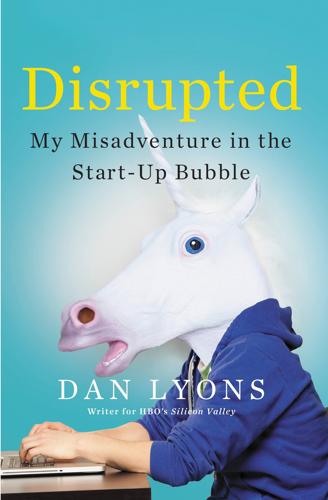
Disrupted: My Misadventure in the Start-Up Bubble
by
Dan Lyons
Published 4 Apr 2016
HubSpot also potentially represents more upside, financially. The big company in Silicon Valley is already big. The people who got rich there were the ones who joined fifteen years ago. HubSpot is just starting out. If HubSpot goes public, and if its stock really takes off—if HubSpot becomes the next Microsoft, or Google—I might make some serious money, something I’ve managed to avoid doing over the course of my career as a journalist. “Basically I’m making a bet,” I say to Sasha, after we’ve put the kids to bed and we’re talking about which job I should take. “The only way the HubSpot job is worth taking is if they’re going to go public and have a big IPO.”
…
In the early days at Facebook, the young employees had a master password to gain access to anyone’s account, according to a book by a former Facebook employee. Dirty tricks have become par for the course at these places. In 2011 Facebook was caught running a sneaky smear campaign, hiring a PR firm to spread negative stories about Google—I know because I’m the reporter who caught them and broke the story for Newsweek. Facebook’s entire business model is based on mining personal data in order to deliver targeted advertising. The same goes for Google and countless other online companies. We have no idea who has access to what. We also have no choice but to go along.
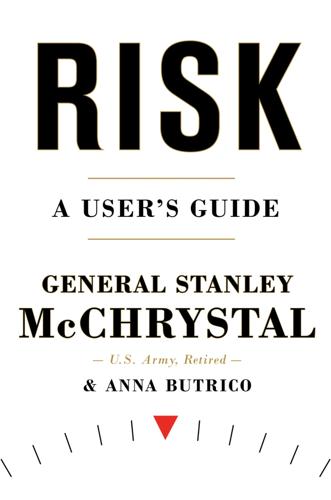
Risk: A User's Guide
by
Stanley McChrystal
and
Anna Butrico
Published 4 Oct 2021
Encouraged to “act like owners” of the company and speak up when issues arose, it was “Googley” to voice concerns, relay worries to leadership, and to be an active member whose skills and opinions shaped the company. As rumors spread about this new project, uneasy Google employees put out feelers to investigate. They dug through lines and lines of computer code to learn more about this controversial project that would potentially use Google’s AI tools as weaponry. Liz Fong-Jones, then an engineer at Google, caught wind of the company’s secret Project Maven—and, in Googley fashion, posted her concerns on a blog post that garnered support from others in the company.
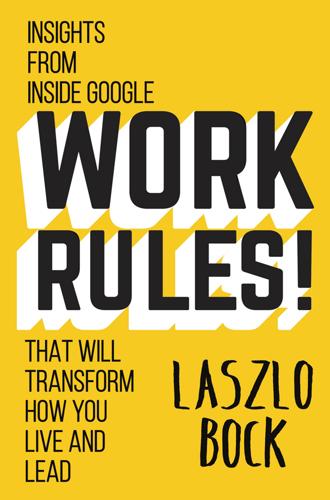
Work Rules!: Insights From Inside Google That Will Transform How You Live and Lead
by
Laszlo Bock
Published 31 Mar 2015
They have modest budgets (typically $1,000 or $2,000 per year) and their brief is to nudge the local office cultures along, staying connected to the rest of Google and encouraging both play and honest discussion. There is no application to be named the leader of a Culture Club. You become one simply by acting like one: taking charge of local office events, being vocal, and—importantly—emerging as a leader to whom others look for advice on what is “Googley.” Eventually, Stacy finds you and asks you to take on the role.63 I mentioned earlier that there are various ways to build great businesses, and companies have been successful with both low-freedom and high-freedom models. Google is clearly in the latter camp. Once you’ve chosen to think and act like a founder, your next decision is about what kind of culture you want to create.
…
In the first half of 2012, we had a 30 percent no-show rate, which prevented Googlers on the waitlist from taking courses and caused us to run half-empty classes. We tried four different email nudges, ranging from appealing to our desire to avoid harming others (showing photos of people on the waitlist so enrollees could see who would be harmed by a no-show) to relying on identity consistency (reminding enrollees to be “Googley” and do the right thing). The nudges had the dual effect of reducing no-shows and increasing the rate at which people canceled their slots in advance, which allowed us to offer them to other Googlers. The effects of each nudge were different, however. Showing the photos of waitlisted enrollees increased attendance by 10 percent but did less to encourage unenrollment.
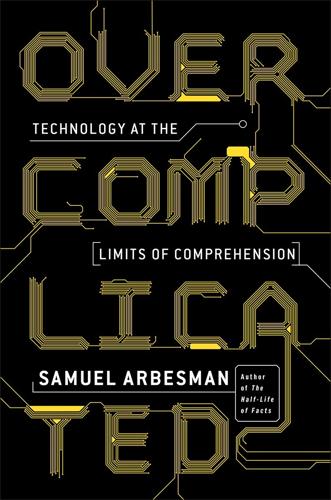
Overcomplicated: Technology at the Limits of Comprehension
by
Samuel Arbesman
Published 18 Jul 2016
building a self-driving vehicle: The complexity of building self-driving cars was discussed by Google[x]’s “Captain of Moonshots” in his closing keynote address at South by Southwest Interactive (SXSW) 2015: Astro Teller, “How to Make Moonshots,” Backchannel, March 17, 2015, https://medium.com/backchannel/how-to-make-moonshots-65845011a277. the exceptions that nonetheless have to be dealt with: One solution is to use humans to manually troubleshoot, or at least hard-code, the exceptions. For example, here’s how Google does this for Maps: “This is a Google-y approach to the problem of ultra-reliability. Many of Google’s famously computation driven projects—like the creation of Google Maps—employed literally thousands of people to supervise and correct the automatic systems. It is one of Google’s open secrets that they deploy human intelligence as a catalyst.
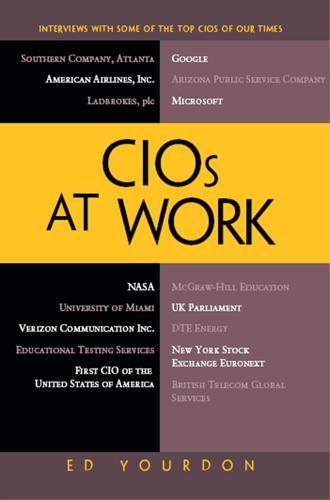
CIOs at Work
by
Ed Yourdon
Published 19 Jul 2011
I thought of myself as someone who was the gearhead in the back, who was the person trying to bring engineering and computer science and so on into industry and that I thought I’d always probably be, as I was at Morgan Stanley in my last role, a direct report to the CIO but with more of a technical focus to my job. But it was the way that the CIO role was constructed at Google—I thought, well, that’s a CIO job I might actually like, I might actually be qualified for. My observation was, and maybe it’s a bit cynical, was that most CIOs carry a heavy burden because they’re typically one of, if not the largest cost centers in their organization. Because so much of their jobs is operations, operationally oriented and execution-oriented.
…
Yourdon: The reason I ask that question is that the traditional picture of the CIO is that it’s the end of the line, and a lot of the people I’ve interviewed are in their fifties or sixties. In fact, I interviewed one CIO who had just resigned—in fact, I take it back, there were three. One man was in his eighties—it’s understandable that he said, “I don’t want to be a CIO anymore.” But, particularly in the technology companies, you, the CIO of Google—I guess he’s in his thirties, but a lot are young people who have risen relatively quickly and they’re in an industry that’s moving quickly, and so they’ve got still 20 or 30 years ahead of them. And as several CIOs have told me, they never planned for this job, and they’re not going to plan for the next job.
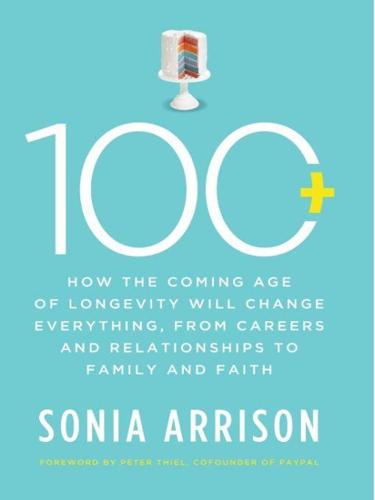
100 Plus: How the Coming Age of Longevity Will Change Everything, From Careers and Relationships to Family And
by
Sonia Arrison
Published 22 Aug 2011
In a June 2010 interview, Brin told Wired magazine’s Thomas Goetz, “Generally the pace of medical research is glacial compared to what I’m used to in the Internet. We could be looking lots of places and collecting lots of information. And if we see a pattern, that could lead somewhere.”72 Goetz therefore correctly observed, “Brin is proposing to bypass centuries of scientific epistemology in favor of a more Googley kind of science. He wants to collect data first, then hypothesize, and then find the patterns that lead to answers.”73 Clearly, engineers are getting their hands wet in the biology area, and this has even forced some mavens to rethink how they talk about the subject. Mike Kope, the CEO of Aubrey de Grey’s SENS Foundation, says that the organization’s message is now quite simple: “repair the damage, don’t chase the pathology.” 74 And although science has made excellent progress when it comes to understanding body parts like the kidney and heart, the brain remains too complicated to fully comprehend.
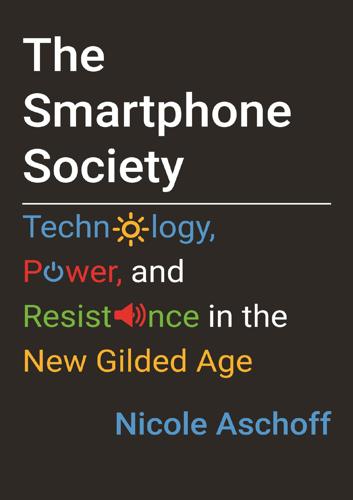
The Smartphone Society
by
Nicole Aschoff
Google workers were likely well aware of this state of affairs, but there is intense pressure inside the firm to present a sunny public face, as one email written by a Google exec demonstrates: “If you’re considering sharing confidential information to a reporter—or to anyone externally—for the love of all that’s Googley, please reconsider! Not only could it cost you your job, but it also betrays the values that make us a community.”29 Google workers are muffled by strict confidentiality agreements that likely violate federal and state employment law. In May 2016 the National Labor Relations Board filed a complaint against the company for “unlawful surveillance and interrogation in order to chill and restrict employee rights.”
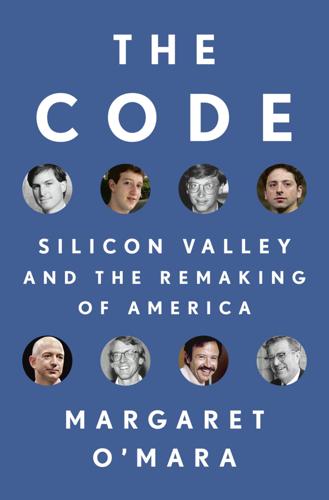
The Code: Silicon Valley and the Remaking of America
by
Margaret O'Mara
Published 8 Jul 2019
Earlier self-actualizing Valley generations had Esalen; the post-2000 crowd had Burning Man. The annual festival of art and drugs and free expression in Nevada’s Black Rock Desert—a self-described “catalyst for creative culture in the world” that the co-founders attended faithfully each year—became metaphor and motif for all things Googley. An homage to the Man adorned the foyer of one of the buildings on Google’s campus. The company sponsored shuttle buses to take Googlers to Black Rock each year. In 2001, a key factor in Brin and Page agreeing to bring in Valley veteran Eric Schmidt as CEO was the fact that Schmidt was already a Burner.10 Schmidt’s hire was a long-fought victory for John Doerr and Michael Moritz, who had insisted the two founders bring on an experienced chief executive as a condition of their first investment and watched in frustration as Page and Brin rejected close to fifty candidates before they settled on Schmidt.
…
Advertisers only paid when the searcher clicked on their link.12 The eagle-eyed Googlers saw what Overture was doing and knew that this was where the future lay. But they didn’t like the other company’s practice of selling search results out to the highest bidder, making it difficult for the user to distinguish a truly relevant site from one that paid for its spot on the list. That definitely wasn’t Googley. Instead, they produced a system (similar enough that Overture sued for patent infringement) that adopted the keyword-auction concept to generate paid results, subtly but clearly marked “ad,” that appeared atop or to the side of a regular search. The site would stay as clean as ever, with its core principles intact.
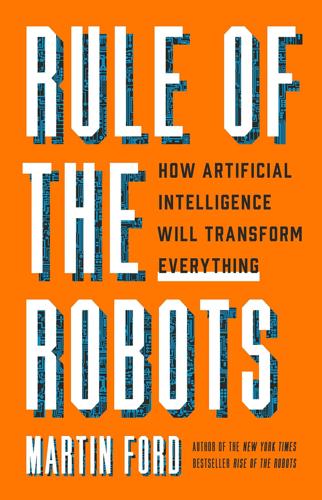
Rule of the Robots: How Artificial Intelligence Will Transform Everything
by
Martin Ford
Published 13 Sep 2021
What’s more, it’s a good bet that artificial intelligence will rise to dominance far faster than was the case with electricity. The reason is that much of the infrastructure required to deploy AI—including computers, the internet, mobile data services and especially the massive cloud computing facilities maintained by companies like Amazon, Microsoft and Google—is already in place. Imagine how rapidly electrification might have occurred if most power plants and transmission lines had already been built at the time Edison invented the light bulb. Artificial intelligence is poised to reshape our world—and it may happen much sooner than we expect it. AN “ELECTRICITY OF INTELLIGENCE” The analogy to electricity is apt in that it conveys the sense that artificial intelligence will be ubiquitous and universally accessible and that it will ultimately touch and transform nearly every aspect of our civilization.
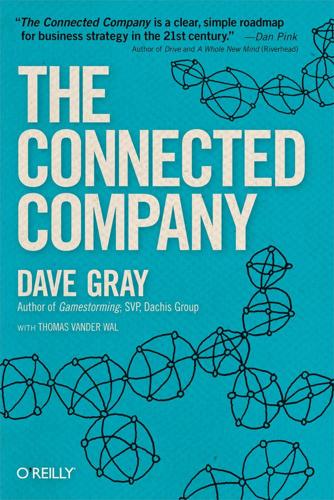
The Connected Company
by
Dave Gray
and
Thomas Vander Wal
Published 2 Dec 2014
Eventually there would be about 2,500 in those four large buildings. “We want to pack those buildings, not just because it minimizes our footprint but because of the interactions you get, just accidental stuff you overhear,” says Salah. “Walking around, you feel good about being here. And that’s what’s Googley. An SGI employee from the 1990s would not recognize those offices today. The GooglePlex, as they call it, is designed like a mixed-use urban space. Googlers eat for free from a selection of cafeterias, managed by top chefs, which offer more options than most city streets. A snack or drink is always just around the corner, and comfy chairs, tables, and common meeting spaces abound.
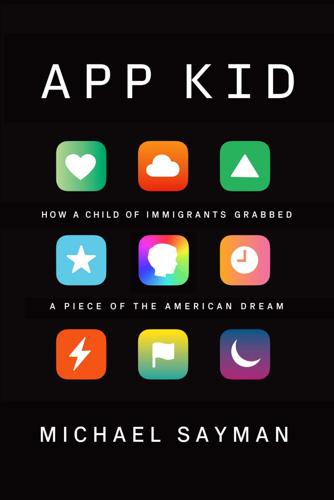
App Kid: How a Child of Immigrants Grabbed a Piece of the American Dream
by
Michael Sayman
Published 20 Sep 2021
Why was I so hard on them all the time for just wanting to be happy? “Hey, Michael!” said my mom. “Yeah, Mom?” “Stop thinking!” She splashed me and I splashed her back. I realized that this was all I’d really wanted the whole weekend. I just wanted to laugh. Chapter 26 The Noogler “Go ahead,” said our leader encouragingly, “get Googley!” Along with a couple dozen other new employees gathered in the brightly painted room, I sat at a low kindergartner-style table, knees up to my ears, cutting out construction-paper shapes with miniature scissors. It was our first day of orientation, and we all wore “Hello, My Name Is” name tags. I was having a blast making cut-out stars and comets, but the others at my table—all appearing to be about twice my age and dressed in corporate-friendly blazers, skirts, and button-downs—did not seem to share my enthusiasm.
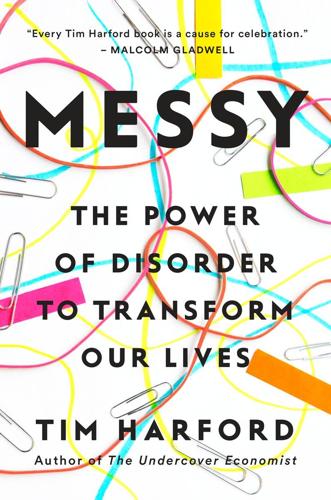
Messy: The Power of Disorder to Transform Our Lives
by
Tim Harford
Published 3 Oct 2016
When Google’s facilities manager came in the next morning, he was surprised to discover that the engineer and his colleagues had knocked it down. But he didn’t complain. Neither did he complain when the engineer later changed his mind and decided he’d like to put the wall back again; instead, he mused that the process had “made it a more Googley environment.” Any veteran of MIT’s Building 20 would recognize the thought process. And when the suit-and-tie executive Eric Schmidt joined Google as the new boss in 2001, he reassured Salah, “Don’t change a thing. Make sure it looks like a dorm room.”26 “No matter what happened,” writes Steven Levy, “engineers would have the run of the place.”27 • • • The offices at Chiat/Day may have looked superficially different from the offices at Kyocera, but they were managed with fundamentally the same tidy-minded aesthetic: This place should look the way the boss wants it to look.
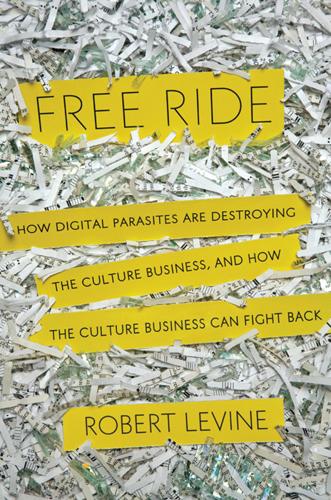
Free Ride
by
Robert Levine
Published 25 Oct 2011
Before Google bought YouTube, its competing Google Video service took some basic steps to screen out copyrighted content, and some executives there believed it didn’t draw as many viewers because YouTube’s tolerance for copyright infringement gave it an edge, according to an internal presentation Viacom quoted in its court documents.56 In June 2006 one Google executive suggested that Google Video could “threaten a change in copyright policy” and “use threat to get deal sign-up,” but another wondered if this tactic was “Googley”—representative of the company’s values.57 It’s hard to know what some of the other executives thought: Hurley lost his e-mail from that time (this happened before Google purchased YouTube), Eric Schmidt testified that he deletes his unless specifically asked to do otherwise, and Google’s cofounder Larry Page, who became the company’s chief executive in April 2011, said in a deposition that he couldn’t remember whether or not he favored buying YouTube—a $1.6 billion acquisition that was the largest in the company’s history.58 “I don’t remember being upset about it,” he said, “so my guess is I was more positive than negative.”59 In March 2010, documents unsealed by the court revealed that Viacom employees had posted clips of the company’s shows on YouTube, and that the conglomerate had explored buying the video site in the summer of 2006.
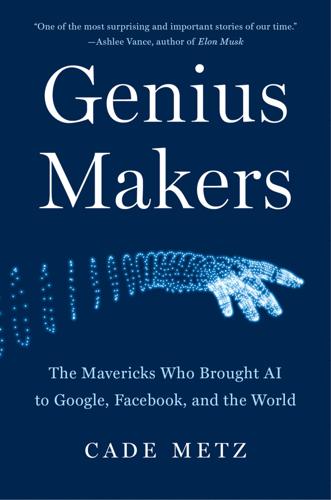
Genius Makers: The Mavericks Who Brought A. I. To Google, Facebook, and the World
by
Cade Metz
Published 15 Mar 2021
That would not be the case with a neural network. Singhal’s message was unequivocal. “I don’t want to talk to you,” he said. Ng also met with the heads of Google’s image search and video search services, and they turned him down, too. He didn’t really find a collaborator until he and Jeff Dean walked into the same microkitchen, the very Googley term for the communal spaces spread across its campus where its employees could find snacks, drinks, utensils, microwave ovens, and maybe even a little conversation. Dean was a Google legend. The son of a tropical disease researcher and a medical anthropologist, Jeff Dean grew up across the globe.
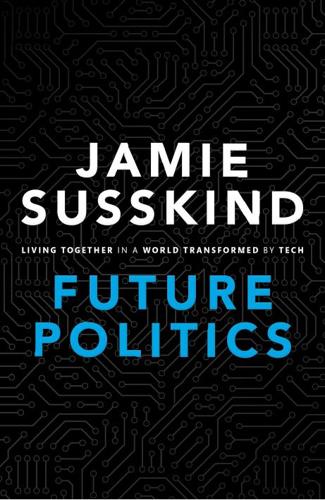
Future Politics: Living Together in a World Transformed by Tech
by
Jamie Susskind
Published 3 Sep 2018
Benkler, ‘Degrees of Freedom’, 21. 15. Eric Siegel, Predictive Analytics:The Power to Predict Who Will Click, Buy, Lie, or Die (New Jersey: John Wiley & Sons, Inc, 2016), centrefold (table 1). 16. Robert Epstein, ‘The New Censorship’, US News, 22 July 2016 <http://www.usnews.com/opinion/articles/2016-06-22/googleis-the-worlds-biggest-censor-and-its-power-must-be-regulated> (accessed 1 December 2017). 17. See e.g. Allison Linn,‘Microsoft Creates AI that Can Read a Document and Answer Questions About it As Well As a Person’, The AI Blog, OUP CORRECTED PROOF – FINAL, 30/05/18, SPi РЕЛИЗ ПОДГОТОВИЛА ГРУППА "What's News" VK.COM/WSNWS Notes 18. 19. 20. 21. 22. 23. 24. 25. 26. 399 15 January 2018 <https://blogs.microsoft.com/ai/microsoft-createsai-can-read-document-answer-questions-well-person/> (accessed 21 January 2018).

The Brussels Effect: How the European Union Rules the World
by
Anu Bradford
Published 14 Sep 2020
It is difficult to quantify the extent of lobbying taking place historically in the EU given that the EU’s transparency register was only established in 2011.117 But since 2011, a considerable number of entities—nearly 12,000 by March 2019—have registered, comprising corporations and civil society representatives alike.118 Out of those registrations, over 1,000 have a head office outside the EU, most commonly in Switzerland and the United States.119 American technology companies in particular are increasing their lobbying presence in the EU: Google and Microsoft’s EU lobbying budget are among the five highest in the EU.120 In addition, the Information Technology Industry Council—a US-based lobbying group representing technology companies such as Apple, Facebook, and Google—is increasing its staff in Brussels because they recognize that the EU is “driving and directing policy.” EU institutions welcome lobbying as part of their commitment to consulting stakeholders about the effect of regulations on them.121 Rather than unduly influencing the regulatory process, the EU views this type of stakeholder engagement as providing valuable information and increasing the legitimacy of EU policy making.122 Yet critics are quick to remind that exposure to corporate lobbying can lead to agency capture and result in welfare-reducing outcomes.123 Foreign critics in particular emphasize how weaker lobbying regulations in Brussels—both regarding attorney-client privilege and lax ethical rules permitting government officials to utilize their influence immediately upon leaving office—allow international lobbying firms to sidestep more stringent foreign laws.
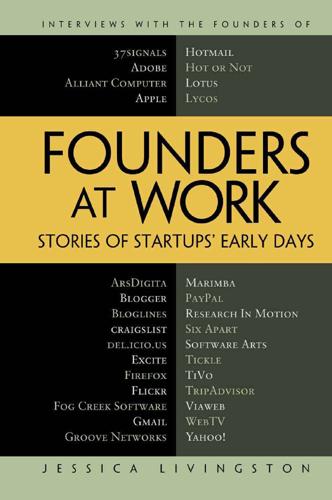
Founders at Work: Stories of Startups' Early Days
by
Jessica Livingston
Published 14 Aug 2008
It’s a lot of machines and a lot of systems to make that all work without requiring an army of people to maintain the system and keep it running. There’s a very complicated system problem there. We were also doing a lot of things that were new to Google. And I guess this is one difference between a regular startup and starting within Google—I think it’s a little bit different now, but at that time there was still this vision that, “We only do web search.” Now we do lots of neat products that go beyond that, but at the time, a lot of people inside the company were sort of unsure. The idea of doing this product that was receiving all the email—and we had to store the email, which is a different systems problem, really, from web search, because 164 Founders at Work in web search you go out and you crawl the web and index that data and the latencies are different.